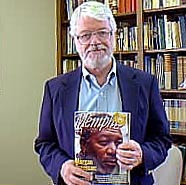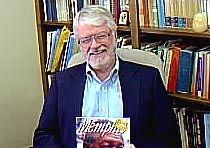Major Works
Short Stories
- “The Consoler” 1996
Memoir
- Vessels of Clay: The Seductive Life of the Priesthood, 2003
Other Works
- Conversations with Graham Greene (editor), 1992
- Graham Greene. An Introduction to His Writings. (January 1986)
- James Clarence Mangan, (1974)
Biography of Henry J. Donaghy
by Christian Waldhalm (SHS)
Henry J. Donaghy was the winner of the Memphis magazine 1996 short story award for The Consoler, a short story which he originally called Vessels of Clay. The story was chosen from over 100 entries. The name of the short story was changed to please the editors. Harry, as he is called by his friends, had published many literary criticisms before, but The Consoler was his first attempt at fiction. His recently written memoir now bears the name Vessels of Clay: The Seductive Life of the Priesthood. The book began as a record for his children to explain his early career as a priest and his decision to leave that calling.
Born in New York City on April 11, 1930, to Irish immigrants, Donaghy grew up in New York City. He went to school at Stonehill College in Massachusetts and graduated with degrees in philosophy and classics in 1954. He earned his master’s degree in English literature from Fordham University and his Ph.D. in the same area from New York University. He had entered seminary in the 1950s and eventually became a member of the Holy Cross order. He was ordained in 1958 but resigned from the priesthood in 1966. He taught at several universities before becoming professor and English department head at Mississippi State University in 1988. He resided in Starkville, Mississippi, until his retirement from Mississippi State University in July of 1997 when he moved to Florida. He has since moved to Las Vegas.
Reviews
A Review of “The Consoler”
by Christian Waldhalm (SHS)
“The Consoler” is a fictional short story by Harry Donaghy, a former Catholic priest who was head of the English Department at Mississippi State University from 1988 until 1997. The story is the 1996 grand prize winner of a competition sponsored by Memphis magazine and was published in the January, 1997, issue. Donaghy initially wrote “The Consoler” (which he originally named “Vessels of Clay”) to show that priests are human beings. Priests are not exempt from the instincts that all people have to deal with. Donaghy shows the difficulty that priests find in controlling these instincts. Priests are expected to be able to control their emotions much more easily than other human beings do. Because priests have always been put on a pedestal, so to speak, Donaghy wrote “The Consoler” to show people that it isn’t necessary or possible to do so. Priests are no more or less human than you or I, and therefore should be esteemed no higher than we.
The story centers around a young priest by the name of Father James McQuaid. He is twenty-six years old, and youth and inexperience are the reasons for his adventurous time in “The Consoler.” Father McQuaid is just finding out what it is to be a priest in the big city of New York, New York.
“The Consoler” is a coming of age story that watches young McQuaid grow to understand and realize things he has never before seen. Things that he has never witnessed are suddenly thrust in front of his eyes, making him known to a world that is waiting with open arms for his arrival. The ending of the story alludes to a world of growth, to understanding, and to an easier, more fulfilling life for McQuaid in the priesthood.
I would recommend that anyone, especially Catholics, read this tantalizing story. This story is not only for Catholics, however. Anyone, even if they know nothing about Catholicism, will get something from this story. “The Consoler” is not only about priests; it is about morality, emotions, and living up to the expectations of others. Most of all, the story teaches one how to deal more easily with the pressures of life in general.



